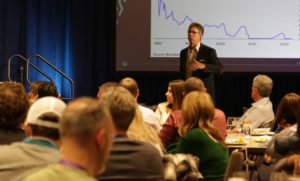Insights on Investing for Dentists
When it comes to the subject of retirement for dentists, I receive many emails. Last week, I heard from a dentist who shared some of the concepts from my recent book, “Inflation: The Silent Retirement Killer” with his Certified Financial Planner (CFP). The CFP replied with a “rebuttal” of alternative investments and a defense of Wall Street.

I have taken the liberty of sharing this entertaining rebuttal (anonymously) along with my commentary. This is a very stark window into the terrible advice (my opinion) that most professionals receive from well-meaning, yet uninformed, advisors. Of course, bad advice can come from well-meaning people.
Most financial advisors are not “bad” people. They're doing the best they can with their training, education, and background. The problem is that they only know what they know. One size fits all, “here’s what everybody does” approaches to investing are going to create average results. I don’t want the average results we’re seeing in today’s market.
I’ve noted the CFP’s comments in red below regarding his thoughts on retirement for dentists…
Rising interest rates – is this time really different?
In the book, I discuss how we are ending a 40 year cycle of declining interest rates. The CFP responded with the following (and I quote):
“‘It’s different this time' We hear this almost daily. It’s usually not different. Even if it is different, how do rising interest rates help the real estate market?“
First off…
For those who have studied market cycles… This time is different. We have levels of national debt and unfunded liabilities that the world has never seen before. That cannot be ignored. Forty years ago the Federal Reserve was able to tamp down on inflation by raising interest rates, causing two major recessions in the process. But they were not facing the debt we are dealing with today. Raising interest rates with this level of debt comes with significant risk. This is a serious problem.
Second, as to how rising interest rates affect real estate…
I don't look at real estate from the standpoint of trying to buy or sell (trading). When you invest for cash flow, you’re playing an entirely different game. I bought my first house when interest rates were 13%+. But it didn’t matter – because the cash flow was strong enough to cover my leverage and expenses with margin.
With the ability to use fixed long-term interest rates, we are able to avoid interest rate volatility on our investments. Can you do that on Wall Street??
In addition, while there will be a rebalancing in the real estate market as rates rise, adjustments don’t happen as quickly in real estate due to the inefficiency of the marketplace. Because Wall Street is such an efficient marketplace, everything can change in a moment. That’s not going to happen in real estate. Change happens more slowly.
Is risk a good thing for investors?
In the book, I warn about the risk of stock market upheaval as rates rise. The CFP’s response to this left me scratching my head… (note, I have quoted here in entirety – please excuse misspellings and grammatical errors.)
“Very Possible. Also, to be very clear: WE WELCOME UPHEAVEL and actually NEED IT in the “stock market.” That is what makes it risky. Risk is the only thing providing the return on owning stocks. No risk, no gain. Was it riskier that you bought [Name of dental practice], vs. working as an EE of someone else? Has the reward been commensurate with the risk? I think I know the answer 😉“
This is totally misconstrued.
He welcomes upheaval in the stock market? I wonder how that has worked out for his clients?
Do any of us who have worked hard for decades to build our nest egg “WELCOME” risk and upheaval?
The only people I know who love volatility are risk junkies (day traders, crypto, options).
Where were the financial advisors and their advice on retirement for dentists back in December of last year?
Were any of them suggesting “hey, maybe you should consider going to all cash to avoid what’s coming”? No. They only have one play in their book – stay aboard the roller coaster. All the time. Every time. Obviously, they have a significant interest in their clients “hanging on” through market volatility.

The dirty little secret is that if your principal drops 20, 30, 40%… You have to create significant returns just to get back to where you started. Percentage gains are more impactful going down than up. If the market loses 50% this year, then gains 50% next year, you will NOT be back to where you started, you’ll still have a net loss! It is possible to have a “positive” average return over several years and still lose principal.
I do agree with his comments about investing in a business regarding the entrepreneurial/capitalist mindset. Is there risk in that?
Yes. But it is a risk that you can actively manage. Your success will largely depend on your ability to make decisions, execute with your brain, your hands and your time. You are in the driver's seat. That is completely different from investing in Wall Street where you have ZERO control of the companies you are invested in or the markets with which those investments are correlated.
Monte Carlo Scenarios when it comes to retirement for dentists – Does this hold up in a market downcycle?
In the book, I point out that the conventional plan is very vulnerable to the risk of a market correction in the first few years of retirement.
“Monte Carlo Scenarios… if you stay the course, and this does happen, you’ll still be in great shape to maintain your lifestyle. Also, remember, we’re going to have 2-3 years of cash on hand for your lifestyle when you retire, so we don’t have to pull out funds during down markets.“
I don't know the specifics or the timeline of this person's financial plan with his advisor. In many cases, “staying the course” in retirement for dentists is shorthand for “keep working until age 59.5” (maybe more). For many doctors, that means years and years of hard work still to come – whether you want to or not.
Also, Monte Carlo scenarios… This is the model that financial advisors know, and prepare clients for, because their accumulation model is about depletion. They know that when their clients retire, they have to take them out of the risky stock market, because they cannot afford a big loss. Typically, this means putting them in T-bills, bonds and instruments that don't take big hits, but unfortunately don't get very good returns.
In addition – “we’re going to have 2-3 years of cash on hand…”
Sounds great. But how are we going to accumulate that cash? More years of hard work. With inflation raging, do you really want years' worth of cash sitting idle? Apparently, this CFP does not have a place to invest that cash without risk, so his options are limited.
The requirements of this accumulation model are extremely difficult to achieve.
Most practitioners must accumulate $8-10M dollars before the advisor feels comfortable telling them they can retire. For self-made professionals, that is a very high bar to reach. Unless you’ve been the benefactor of a trust fund or a very big home run, accumulating $8M is going to take a lot of work. Most are trying to figure out how to get out with 2,3,4 or $5M.
Hopefully, your back and neck are not hurting too much, because you’re going to need a lot more years behind the chair.
Inflation is bad – but what are the alternatives?
In my book I talk about how inflation destroys a nest egg. A million dollars loses 50% of its purchasing power every six years with a twelve percent rate of inflation. The CFP replied…
“Can we control this? What are the alternatives? What gives you confidence the alternatives will be insulated from inflation?“
Yes. There are alternatives. 🙂

Historically (I don't mean just in my lifetime, but even further into history) real estate is an excellent inflation hedge on two fronts when it comes to retirement for dentists. Not only does the value of real estate keep up with inflation, but also the cash flows keep up as well.
Most financial planners and money managers today (unless they're my age, or older) have never seen inflation before. They have only read about it in their theory books.
I can't control inflation, the Government, or interest rates. What I can control are my investments. I can make very specific investments in real estate on either the equity or debt side that allow us to navigate these market cycles.
The financial planner really has not many tools at hand, other than to just tell a client to “hang on. Eventually the market will come back up again.” That's not very much to hang your hat on. This is especially true for the first few years after exiting practice. I can’t tell you how many times in previous recessions we’ve seen business owners who exited right before the bust experience a deep plunge in their principal investments and were forced to go back to work.
That sad story has played out too many times. It doesn’t matter what the fancy computer algorithms from their financial advisor say… when the hit comes in retirement, it creates the difficult choice between downsizing lifestyle or going back to work. That wasn’t in the plan!
Does investing in stocks give you Real Estate exposure?
The CFP tries to make the case that his client is already invested in real estate (Surprise! Didn’t you know?)
“YOU DO OWN REAL ESTATE! You own THE most highly profitable real estate companies in the world – I’ll show you! Also, Applebee's owns their locations, and you own shares of Applebee's, therefore you directly own real estate by owning them.“
Where to begin…
First off, Applebee's stock (part of Dine Brands Global) is down 4.7% year-to-date at the time of this writing. If that’s the best example this CFP can give, that’s not good.
To be clear – I don’t want to own ANY real estate that is correlated to the stock market.
The real estate sitting underneath an Applebee's might be a great investment, but Applebee's stock value is not based on the valuation of that real estate. It is subject to the stock market and the valuation of their business operation. There are numerous case studies of businesses whose stock values were destroyed despite being built on prime real estate. It is fundamentally a bad construct to equate the value of Applebee’s stock with the real estate the restaurant sits on.
Here I will concede – there is a potentially valid approach to investing on Wall Street that is based on extensive due diligence of individual specific companies (Think Warren Buffett). The question is… do you have that expertise? I certainly do not. Could it be learned? Probably over decades, like Warren Buffett. There are so many variables – and the inseparable correlation with the market as a whole.
To me, real estate is a lot easier to understand its fundamentals. And I want to understand the fundamentals of my investments.
If I just buy stocks based on what some technical charts show me… That's really not giving me what I need to know. I want the fundamentals of the assets to be driven not by behaviors or emotions, but by actual data that we get from the cash flows that tells me I've got sustainability.
The Cons of Real Estate in Retirement for Dentists
This CFP went on to list a number of cons to real estate.
Other cons of real estate investing:
- Large fees (closing costs, selling costs, management costs, repair costs, etc.)
- Illiquid (how do you get your money out of the investment? Sell the property and incur all the fees above)
- Undiversified (it’s the exact opposite of owning 1,000’s of companies with many more properties around the world)
- Side job (you are in one of THE most profitable industries on the planet, why take on a side job of owning real estate and get much smaller margins?)
Large Fees:
My ROI in real estate (net = after all costs/expenditures) has outperformed the stock market over 40+ years. Period. Of course, there is no mention here of the fees that most financial advisors charge.
Lack of Liquidity:
Again, this financial advisor doesn't understand real estate. Buying local properties in your neighborhood may limit your liquidity options. That’s not wise for most (likely the only way this CFP knows). At Freedom Founders, we have an entire economy within our community.
Capital is being invested, deployed and redeployed all the time. That means that money is moving constantly – creating significant liquidity. At any time I have a network through which I could sell or borrow against equity of my real estate with a moment’s notice. This is an economy that this CFP has never experienced and therefore does not understand.
Lack of Diversification:
I and my Freedom Founders members are diversified in niche real estate markets across the US. The inefficiency of these markets means that what is happening in California does not necessarily affect my investments in the Midwest. This diversification cannot be achieved on Wall Street. In the stock market, when a correction comes, it is very difficult to avoid the bloodbath – no matter how many different stocks you own. Diversification means nothing if everything is going down.
There is no safe haven on Wall Street. But in real estate? I can diversify in different markets and asset classes. I can also shift my portfolio from equities (direct ownership) to private lending (being the bank – lending that is secured by real estate assets). I have a wealth of tools at my disposal to diversify and shift with the markets.
Real Estate as a Side Job:
I agree completely with this last premise. He's absolutely right. Owning any business is a lot of work. That is why I do NOT recommend trying to go out and acquire properties in your local neighborhood. Unless you are early in life (young, unmarried, not tied down to a practice) – trying to juggle it all will be too much. That is the only kind of real estate investing that most people know. It’s what they see on HGTV. To his credit, this financial advisor has probably seen clients try this approach to real estate with less than stellar results.
Becoming a successful passive investor is about strategic collaboration with the right people to bring your capital to the table in a deal without doing all of the leg work of acquisition, value add and management.
Are bonds really a safe haven when it comes to investing for dentists?
The last note here from this certified financial planner is with regard to bonds. It sums up the conventional approach to retirement for dentists and managing risk.
Bonds may or may not be part of your long-term strategy. Bonds are mostly there to shorten the ups and downs of the rollercoaster for investors that don’t understand long-term investing. When people get sick to their stomachs when the stock market goes way down – thinking they’ve actually lost something – then we can add in some bonds to dampen the losses. I can personally tell you, that I will most likely never own bonds in my portfolio in my lifetime. But my portfolio won’t ever be for sale (hopefully, as nothing is guaranteed) .
First off, he suggests that when the markets go “way down” you haven’t actually lost anything… but in the same sentence talks about adding in bonds to “dampen the losses”?
To a CFP, watching the market drop may not equate with realized losses, but it’s not his future riding the roller coaster. The older I get, the less interested I become in watching everything I’ve worked for whipsaw with the whims of the market.
The bond market has historically been a safe haven from volatility. It is being the bank – theoretically a safer place in the capital stack. The problem is that, circling back to the original premise – we have just completed a 40-year cycle of declining interest rates. Bonds will likely not be a good play for the rest of our lifetimes.
Even this CFP knows it – “I will most likely never own bonds in my portfolio in my lifetime.”
This leaves no safe haven. Wall Street has no alternative. The last 6 months have been a huge wakeup call. It’s time to shift to a model that offers more control. That’s what I’ve done all my life.
I’ve also seen the results in hundreds of other people’s lives. It may not be the only path when it comes to retirement for dentists – but it is a pathway that works. I've always been in the forefront of figuring things out for myself. Not just blindly, but finding the right people. And I think that's the key.
It goes without saying that consulting with professionals is a wise practice. I often consult with professionals with the expertise I need (Attorneys, CPAs, etc) when I am trying to make a decision. Consulting with professionals is not the same as abdicating the decision to them.
Bottom line: the majority of financial advisors don’t understand real estate as part of the plan of retirement for dentists.
It’s not their educational background and therefore it doesn’t fit within their wheelhouse of investment strategy. Finally, they lose assets under management (commissions or fees) if a client chooses to invest in alternative investments outside of the predominant Wall Street establishment.
The future belongs to those who are willing to become their own financial advocate – taking responsibility for their investments and their future – NOT surrendering that to anyone. No one cares for your hard-earned money and your future as much as you do.


